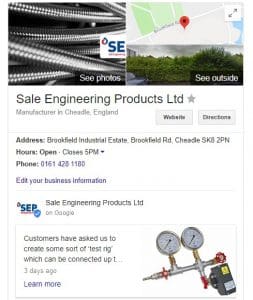
Have you ever visited a website, waited too long for it to load and, impatient, left the site to look elsewhere? Well, if your own company’s website is slow to load, your potential customers will be doing exactly the same thing and you could end up missing out on business.
Google’s own research shows that roughly 53% of mobile users leave a site if it hasn’t loaded within three seconds. For your company, that means fewer conversions and sales; for your website, that means it could drop down Google’s rankings, rendering your SEO efforts almost worthless, as site speed is an important ranking factor.
In this blog post, we’ll explain some of the steps you can take to speed up your website. But first, you should use a tool such as Google’s PageSpeed Insights, which will rate your site’s speed from 0-100 (the higher the better) and provide some suggestions as to how you might bring its loading time down.
Change Your Website Host
A high quality website host can make all the difference when it comes to speeding up your website, as server response times can vary between providers. If you use a reputable host, their support team should also be able to offer advice on improving performance. Remember, though, that you are not tied to your hosting provider; if you’re not satisfied with their service, consider switching. If you run an e-commerce site, you may also want to consider moving to a more specialised hosting platform.
Compress Images
One of the main reasons websites load slowly is because of a lack of image compression. Images taken on modern cameras, including on most mobile phones, are very high resolution and their file sizes can run into the many megabytes, which is a far higher quality than you’ll need for your site. Adding images as they are will slow your website down dramatically. Before uploading, make sure you compress every image. You can do this using tools such as compressjpeg.com or the more powerful FastStone Photo Resizer.
Set up Caching
So that a browser does not have to completely reload all the elements of a web page when a user revisits a site, it will ‘cache’ some of the information, such as images, code and stylesheets. In the backend of your website, you should be able to allow caching and then set the amount of time a web page is cached for. As you probably won’t change the content of the main pages of your site very regularly, you could set this period to be as infrequent as once a month.
Use a Content Delivery Network
Content Delivery Networks, or CDNs, are superfast networks that store web pages and deliver them when needed based on a user’s geographic location. That means that if your site is hosted on a UK server, but is visited by someone in another country, they will be shown a version of your site hosted closer to their location. This should allow them to access your site much more quickly.
Remove Unnecessary Plugins
Using plugins is a great way to boost the capabilities and functions of your site, but if your website is slow, it might be a sign that you either have too many, or perhaps more importantly, that the ones you are running are of poor quality. They’ll tend to slow your website down if they have to load lots of styles and scripts. You should try to only use the plugins which are absolutely necessary. Look through your existing plugins and check whether they actually serve any purpose on your site, or whether you could do without them.
Change Your Theme
Some themes might look fantastic, but all those animated features and complex layouts you see may actually be slowing down your site. Aim for a simpler theme and consider whether you’d actually even use the majority of features on offer.
Help From Creation ADM
We’ve tried to keep things fairly simple here and haven’t delved into the more technical side of optimisation, such as fiddling with the site’s code, but if all this seems a bit overwhelming, we’d be happy to have a look at your website and give you some advice. We’re a marketing, branding and web design agency in Manchester, so if you’re based in the area please give us a call on 0161 236 3939 or fill in our contact form (include your site’s URL) and we’ll get back to you.
More Stories
You Shouldn’t Use Clickbait – The Reason Why Will Shock You!
Clickbait – You’ll Never Guess What It Is! The Oxford English Dictionary defines Clickbait as ‘content whose main purpose is to attract attention and encourage…
You Imagine – We Create
As part of our ongoing relationship with ceda, we have developed a new video for them to help their membership explain the many ways they…
Google My Business
Google My Business is one of the most under used marketing tools we come across. It’s completely free and relatively easy to set-up and it’s…



